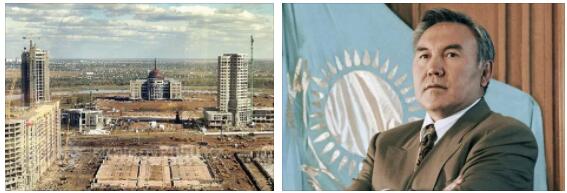Became independent in 1991, Kazakhstan, the largest of the former Soviet states of Central Asia, set itself the priority objective of strengthening its role in the regional and international context. The maintenance of close relations with Moscow was therefore accompanied by an attempt to diversify the country’s relations: relations with important neighboring states, such as China, Iran and Turkey, and with Western countries were consolidated. The objective of increasing economic and commercial exchanges brought out the need for the country rich in mineral resources to open transport routes that were alternative to those that crossed Russian territory. In fact, the Kazakh government aimed at the increase in oil production and exports to revive the country’s economy,1990, was marked by widespread corruption phenomena.
According to Animalerts.com, Kazakhstan played an important role in the regional integration process that developed during the 1990s. Promoter of greater coordination between the member states of the CIS, he entered into a customs union agreement with the Russian Federation and Belarus in January 1995, strengthened in March 1996by the accession of Kyrgyzstan and the signing of a treaty between the four countries. consolidation of economic, cultural and social relations, aimed at the birth of a ‘community of integrated states’. Kazakhstan also shared efforts for greater economic cooperation with Uzbekistan, and several agreements to this effect were stipulated between the two countries as early as 1994. Having become the fourth nuclear power following the dissolution of the USSR, Kazakhstan, which had acceded to the Treaty on Non-Proliferation in 1993, completed the dismantling of its nuclear weapons (partly destroyed, partly transferred to Russian territory) in May 1995.
With Moscow, which was the main economic partner of Kazakhstan were also signed several bilateral agreements: a treaty of friendship, cooperation and mutual assistance was signed in May 1992, in 1995 it was established to create a joint military force and in July 1998, together with a declaration of friendship and alliance, further economic and technical cooperation agreements were stipulated regarding the exploitation of offshore fieldsof the Caspian Sea. In relations with Moscow, however, the problems linked to the presence in Kazakhstan of a consistent Russian-speaking minority weighed heavily. The latter, which claimed, among other things, the adoption of Russian as a second official language and the possibility of obtaining dual citizenship, was the protagonist of a massive exodus towards the Russian Federation, while it was at the center of repeated unrest, in 1992 and again in 1994 – 95.
As for other former Soviet states, the end of the communist regime did not lead to the start of a process of effective democratization: the widespread corruption and authoritarian tendencies implemented by N. Nazarbaev (president of the Republic since December 1991) marked political life during the 1990s. A new Constitution was adopted in January 1993, introducing a presidential-type political system, and in March 1994 the first legislative elections, the regularity of which was contested by international observers, assigned the majority of seats to supporters of the president: among these, the deputies of the Party of People’s Unity, which Nazarbaev himself had formed in January 1993, after abandoning the leadership of the Socialist Party.
In March 1995, after the publication of a ruling by the Constitutional Court declaring the 1994 legislative elections illegal, the president prematurely dissolved Parliament, giving himself the power to govern through decrees until the holding of new legislative elections. After having obtained, by means of a referendum (April 1995), an extension of the presidential term until 2000, Nazarbaev promoted the launch of a new Constitution, which further strengthened presidential powers. The elections for the bicameral parliament, held in December of the same year, recorded an affirmation of the political forces close to the president, but numerous irregularities were detected by international observers. In October 1998 a constitutional amendment anticipated the presidential elections, which, held in January 1999, confirmed Nazarbaev by a large majority.
